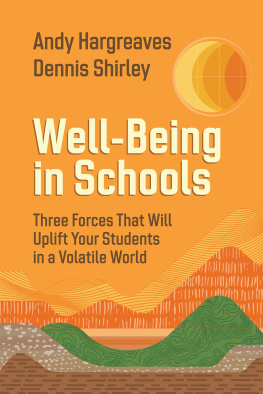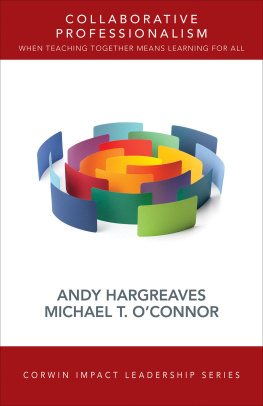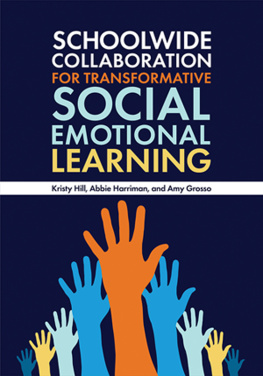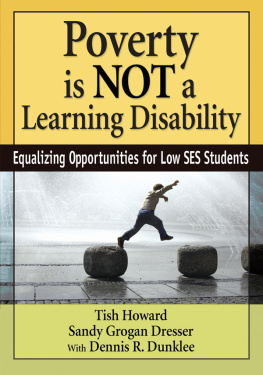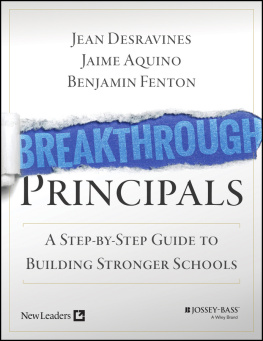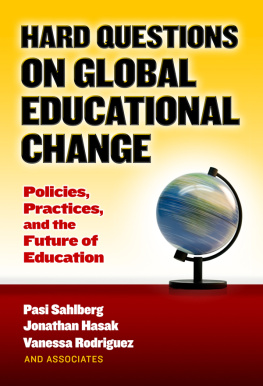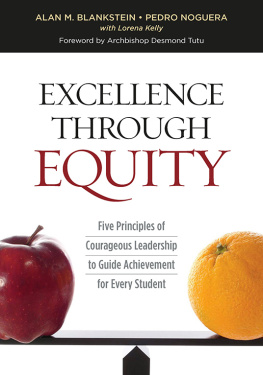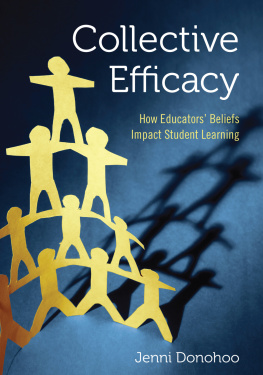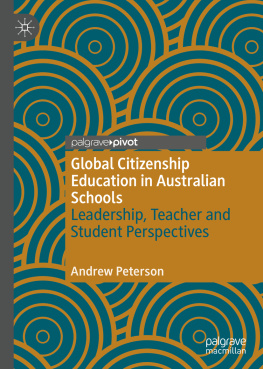Contents
Guide
Pages for Well-Being in Schools
Acknowledgments
....................
We are grateful to many people for inviting us to work with them on well-being. Michelle Forge and Michael O'Keefe of the Council of Ontario Directors of Education (CODE) asked us to conduct research on the consortium of 10 Ontario districts that they organized and led. Shane Washington-Wangia, Chris Bacon, and Mark D'Angelo served on our Boston College research team and significantly helped develop our thinking in relation to issues of inclusion and identity. Danette Parsley, Mike Siebersma, Matt Eide, and other members of the leadership team on the NW RISE project expanded our horizons about the rewards and challenges of improving education for students in remote rural communities in the Pacific Northwest. We are grateful to our research team on this project who, at different points, comprised Elizabeth Cox, Michael O'Connor, and Minjung Kim.
Dean Elaine Munthe of the University of Stavanger in Norway graciously invited us to be visiting professors from 2014 to 2020, where we worked with her and her colleagues as well as public school educators in the nearby municipalities of Rogaland and Sandnes. We learned a great deal from the quietly deliberate and collaborative ways that Norwegians organize their schools and their society, especially with regard to thriving in nature.
One topic in our discussion of well-being is technology. Andy is the director of CHENINE (Change, Engagement and Innovation in Education: www.chenine.ca) at the University of Ottawa Faculty of Education. CHENINE addresses how digital technology is presenting opportunities for and posing risks to students and teachers in and beyond the COVID-19 pandemic. He would like to thank his colleagues Amal Boultif, Phyllis Dalley, Megan Cotnam-Kappel, Michelle Hagerman, Joel Westheimer, and Jessica Whitley for their many contributions to his thinking about these issues that are expressed within this book.
Dennis would like to thank his colleagues at the Bosch Foundation in Berlin for the award of a Richard von Weizscker Fellowship to study the impact of the digitization of learning on educational change and the future of work. The staff, comprising Sandra Breka, Jannik Rust, and Madeleine Schneider, have generously supported his research.
At different times this book references other research articles that we have published together and separately. Parts of our writing here have drawn on these sources. We acknowledge their permission for reuse.
Finally, we extend our thanks to our wives, Pauline and Shelley. They have been our companions for many decades now, and we are grateful for their many contributions to the development of our ideas. This is the fourth book that we've written together, and there is no way that we could have kept going without their steadfast support. When John Donne wrote that "no man is an island," he must have been thinking of people like us!
Praise
....................
Bravo to authors Hargreaves and Shirley for standing up for children's well-being and happiness! In a style that is accessible and free of jargon, this book teaches us that children cannot learn when they are lonely, alienated, or unhappy. Drawing on research and plain common sense from before and during the COVID-19 pandemic, this book reminds us what really matters in education. The thoughtful lessons apply not only to schools but also to community centers, sports clubs, and anywhere else that young people congregate.
Dr. Ruth K. Westheimer, author, media personality, therapist, and adjunct professor, Columbia University
Well-Being in Schools is an inspiring and revolutionary book. It's about far more than the title suggests. Readers of this fine work will come to view the public school as a metaphor for all of society. Applied to schools and beyond, the three powerful forces it identifiesincluding a call to renew our relationship with naturecan reshape the lives of children and adults right now, while offering us hope for a newer world.
Richard Louv, author of Last Child in the Woods: Saving Our Children from Nature-Deficit Disorder and Our Wild Calling
Andy Hargreaves and Dennis Shirley's Well-Being in Schools is a brilliant journey through the global and local landscapes, fields, and foibles of well-being theory and practice in education. In a highly readable way, the authors take us through every different permutation of thinking about young people's well-being, examine its limitations, and offer new insights about ways to prioritize well-being in policy and practice. I thoroughly recommend this book to all those who are interested in placing well-being in schools much higher up the policy agenda.
David H. Edwards, PhD, General Secretary, Education International
This timely and highly accessible book is extremely important in these volatile times. Focusing on three core forcessocial prosperity, ethical technology use, and restorative natureHargreaves and Shirley make it clear that schools can no longer rely only on content delivery with occasional forays into social and emotional learning if we want to prepare students for the increasingly tumultuous world in which they live.
Jean Clinton, clinical professor, Department of Psychiatry and Behavioural Neuroscience, McMaster University, Canada, and Michael Fullan, professor emeritus and former dean, OISE/University of Toronto
Well-Being in Schools provides a comprehensive road map for teachers and leaders alike to firstly understand and secondly create the conditions for student well-being and achievement. Rich and vivid examples of emergent and promising practice from school systems around the world drive home the reciprocal relationship between well-being and student success. This is a must read for school and system leaders.
Kevin Godden, EdD, superintendent
How can our schools enable young people not just to achieve academically but also to "live long and prosper?" And what can we learn from education systems that do both of these things well? Andy and Dennis outline how the pandemic is showing us what really matters in education and is sharpening our thinking about what needs to change. This timely and wide-ranging book pulls no punches. Full of international analysis and insights, it inspires us to believe not only that it is imperative for our young people that we build back better but also that it might just be possible to do so. I loved it.
Steve Munby, visiting professor, University College London and former CEO, National College for School Leadership, England
Student well-being has become the key element of successful education systems. This important book shows how learning to be well is not just about your well-being or mine, it is a social condition that includes all of us. There is no better time than now to dive deeper in the meaning of student well-being. I recommend this book to teachers, school leaders, and policymakers as a guide how to build a better and healthier world through education.
Pasi Sahlberg, author of Finnish Lessons 3.0: What Can the World Learn from Educational Change in Finland?
Andy Hargreaves and Dennis Shirley capture the art and science of student well-being as the fundamental building block to our present and future. They weave theory, practice, and policy together to give us practical and relevant next steps to our work in

